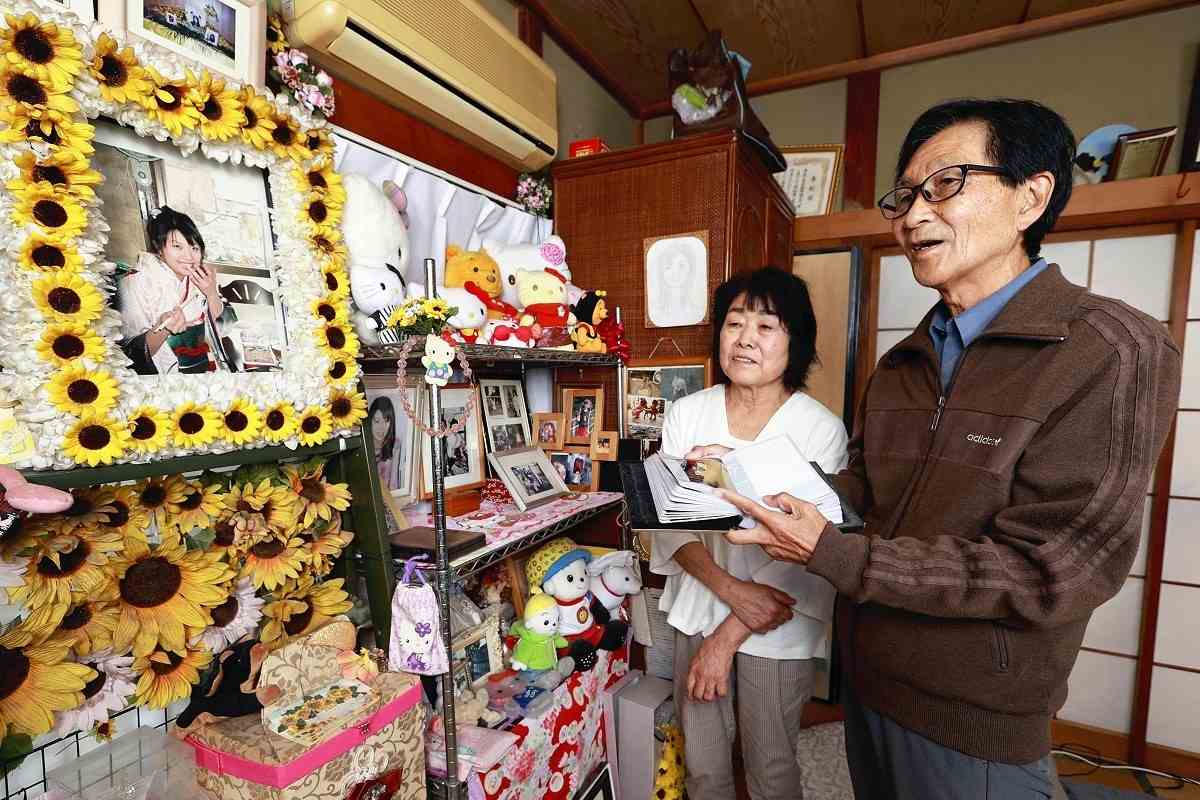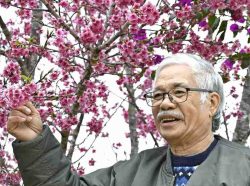
Kenichi Ino (Right) and Kyoko Ino (Left).
17:22 JST, October 27, 2024
Ageo, Saitama Pref. (Jiji Press)—Kenichi Ino, father of Shiori, who was murdered 25 years ago after falling victim to stalking, is determined to continue his activities to make sure no one suffers such harassing behavior.
“While days go by one by one, I’ll keep on taking over Shiori’s thoughts,” says Kenichi, 74, who continues to give lectures across the country with an aim to eradicate stalking.
On Oct. 26, 1999, Shiori, then a 21-year-old university student, was stabbed to death in front of a train station in the city of Okegawa, Saitama Prefecture, north of Tokyo, after falling prey to stalking.
A brother of Shiori’s former boyfriend and three other people were arrested on suspicion of murdering her. An indefinite prison term was finalized for the boyfriend’s brother, while the other three were sentenced to 15 to 18 years in prison. The former boyfriend killed himself.
The incident led to the enactment in 2000 of a law against stalking.
Shiori was stalked for more than six months by the former boyfriend and others, with hundreds of leaflets slandering her posted at places around her home.
Shiori filed a criminal complaint with the Ageo police station of the Saitama prefectural police department against the stalkers for alleged defamation.
But police officers who took charge of the matter altered the investigation document and asked her to withdraw the complaint. The murder occurred while the police did almost nothing to help her.
Over the falsification of the investigation report, three former officers at the Ageo police station were given suspended sentences.
The victim’s mother, Kyoko, 74, says: “Shiori cared about the family and had many friends. So I’m frustrated that I lost my daughter like this.”
To make matters worse, media coverage about the incident heated up, and some inappropriate reports tarnished her reputation.
Against the background, Kenichi and Kyoko started activities to eradicate stalking and establish the rights of crime victims.
Kyoko joined the National Association of Crime Victims and Surviving Families, which was formed in 2000. Activities by the group’s members led to the establishment of a basic law for supporting crime victims and the introduction of a system allowing crime victims to take part in criminal trials.
Now a member of an organization that was set up in 2022 to succeed the association of crime victims and families, Kyoko is working to realize the establishment of a government agency serving as a window for consultation support for crime victims.
“Crime victims would feel relieved if there is a place where they can seek consultation support,” Kyoko says.
About six months after the murder, Kenichi started to speak to an audience about damage related to stalking. He has so far given such lectures about 120 times in 40 of the country’s 47 prefectures.
From around seven years ago, Kenichi began to deliver lectures also at police academies and other police facilities. Kenichi says he was surprised when he was first asked by police to give a lecture, because he had lodged a lawsuit over negligent investigations into his daughter’s case by the Saitama prefectural police.
He has spoken about his experience at the police departments of 12 prefectures. He often tells police officers and police officer candidates: “You are the last line of defense. I want you to do your best to let no one become a victim.”
Some who listened to Kenichi’s lectures told him that they aimed to become police officers after learning about the Okegawa incident.
Kenichi aims to continue delivering lectures with a determination to eradicate stalking and ensure that no one suffers the same fate as that of his daughter.
Top Articles in Society
-

JAL, ANA Cancel Flights During 3-day Holiday Weekend due to Blizzard
-

Man Infected with Measles May Have Come in Contact with Many People in Tokyo, Went to Store, Restaurant Around When Symptoms Emerged
-

Australian Woman Dies After Mishap on Ski Lift in Nagano Prefecture
-

Foreign Snowboarder in Serious Condition After Hanging in Midair from Chairlift in Nagano Prefecture
-

Record-Breaking Snow Cripples Public Transport in Hokkaido; 7,000 People Stay Overnight at New Chitose Airport
JN ACCESS RANKING
-

Univ. in Japan, Tokyo-Based Startup to Develop Satellite for Disaster Prevention Measures, Bears
-

JAL, ANA Cancel Flights During 3-day Holiday Weekend due to Blizzard
-

Japan Institute to Use Domestic Commercial Optical Lattice Clock to Set Japan Standard Time
-

China Eyes Rare Earth Foothold in Malaysia to Maintain Dominance, Counter Japan, U.S.
-

Man Infected with Measles May Have Come in Contact with Many People in Tokyo, Went to Store, Restaurant Around When Symptoms Emerged
























